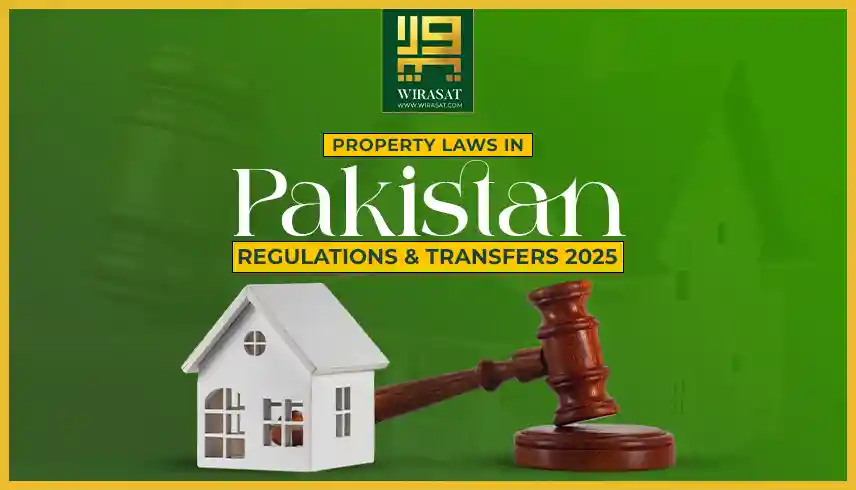Property Laws in Pakistan: Regulations & Transfers 2025
Property ownership is the backbone of individual stability as well as economic stability.In Pakistan, property acquisition, ownership, transfer, and inheritance have all been encompassed under a vast legal framework. Accordingly, individuals, corporations, and investors need to understand property laws in Pakistan. As we move forward toward the year 2025, it has become imperative to stay updated with property laws in Pakistan, including amendments or interpretations introduced.
At the foundation of property laws in Pakistan are certain root ideas that arise in confluence between Islamic law, the British common law tradition, and layers of locally-made law. This is a very heterogeneous legal framework for determining an orderly and sympathetic way of dealing with all activities around property.
Key Regulatory Frameworks Governing Property:
A few key legislative instruments underlie the shape of property laws in Pakistan. These laws embody the rights and duties of the property owners, the modes for property transactions, and methods for resolving disputes in respect of property. Some of the major statutory instruments include:
- The Transfer of Property Act, 1882: This act provides all the general principles as they relate to the transfer of immovable property between living persons. It contains provisions for the various forms of transfer, such as sale, mortgage, lease, gift, and exchange, together with the appropriate conditions and formalities with regard to each one. For example, Section 54 of this Act defines a sale as a transfer of ownership in consideration of a price paid or promised, or partly paid and partly promised.
- The Registration Act, 1908: In this story, 1908 still held out the contention titled “Registration Act.” This Act stipulates that by registering particular transactions of property, the transactions enter public notice so that conformity is given on the authenticity of the title. In addition to preventing fraud, registration records ownership. For example, instruments dealing with such property include sale, gift, or mortgage of it as per this Act.
- The Land Revenue Act (various provincial adaptations): It sets up land survey systems, settlement, and recording of rights over land, which are fundamental to making an ownership claim. Each province, Punjab, Sindh, Khyber Pakhtunkhwa, and Balochistan, has its Act that caters to the specific needs of that province.
- Specific Relief Act, 1877: It provides remedies such as giving people remedies over breach of contracts concerning properties, for example, specific performance, wherein the court can enforce either party to carry out the legal obligation of transferring property.
- Religious Inheritance Law: In Pakistan, the issue of inheritance of property is addressed with predominant authority by the personal laws of the deceased according to the stated blood religion. For Muslims, it involves Islamic laws of inheritance (Fara’iz), which prescribe the shares of legal heirs. In the case of non-Muslims, their corresponding personal laws come into play.
- Provincial Housing and Town Planning Ordinance/Acts: These laws are referred to as regulations for managing urban development, zoning, and building control, and site development for housing schemes. Their importance is more concerning the potential utility and transfer of property in an urban area.
Regulatory Framework for Property Transfer 2025:
In Pakistan, property transfer entails certain steps that ensure legal validity and secure ownership. The legal basis for the transaction remains unchanged, notwithstanding administrative modifications or technological advances that could produce some subtle changes in the manner property transfer will be conducted in 2025. Generally, the property transfer procedure consists of:
- Agreement for Sale: The entire process typically begins with the written agreement between the buyer and the seller, which states those terms relating to the sale as laid down and agreed to in the agreement, such as price, payment schedule, and possession date. This agreement is almost always executed on Stamp Paper and is to be registered as well.
- Title Verification: The buyer (or his counsel) shall conduct due diligence to verify the seller’s title to the property, including an examination of all property records available within the local land registry or revenue office to uncover any encumbrances, liens, or disputes concerning the property.
- Preparation of Transfer Deeds: The instrument of transfer specifies the description of the property being transferred, an indication of the parties to the transaction, consideration, and the terms of transfer.
- Making Payment for Stamp Duty and Registration Fees: The taxes levied on property transfers, namely stamp duty and registration fees, are then paid to the government. The rates for stamp duty and registration fees vary from province to province and depending on the value of the property.
- Registration of Transfer Deed: Transfer deed, along with its related documents (the identification of parties, property documents, etc.), is presented to the relevant registration authority. After verifying the documents and identities of the parties, the registering officer registers the deed. Registration lends legal weight to the transfer and puts the public on notice of the new ownership.
- Mutation of Property: After registration, and usually on the heels of it, the buyer will apply for mutation in the records of the property in their name with the land revenue department of that locality. This process updates the official land records in relation to the new ownership.
- Possession: The buyer shall take physical possession of the property in terms of the agreement.
Possible instances of development and new property laws:
While there are no major “new property laws” on the books at the federal level as of early 2025, there are still some developments and areas where changes could occur:
- Digitisation of Land Records: Various provinces are making some progress in the digitisation of land records to promote transparency, decrease fraud, and expedite property transactions, including an online portal for records access and possibly an online registration process in the future.
- Amendment to Existing Laws: Occasionally, a minor amendment is applied to an existing provincial or federal law concerning property; however, it might be in an effort to address specific issues or facilitate certain processes. Staying up to date with the official gazettes and news articles on laws is vital.
- Focus on Property Rights: There is tremendous emphasis on the protection of property rights and the resolution of disputes resourcefully by way of specialised tribunals and alternative dispute resolution mechanisms.
Rules for Real Estate Development: The provincial governments are continuously refining rules applicable to real estate developers to bring about transparency, protection of buyers, and environmentally sustainable development. This might extend into project approvals, escrow accounts, and delivery on time.
Conclusion:
It is important for all individuals participating in real estate to have a basic knowledge of property laws in Pakistan and the rules governing property transfer. While the basic legal principles will probably remain established, knowledge about specific procedures, newly emerging property laws or amendments, and those ongoing gravitations towards digitisation are vital for a smooth navigation across the property landscape in 2025. While seeking property transactions, it is always wise to obtain legal assistance for compliance and interest protection. Due to the evolving nature of property law, one must remain continuously aware of business transaction safety and legality in Pakistan.




